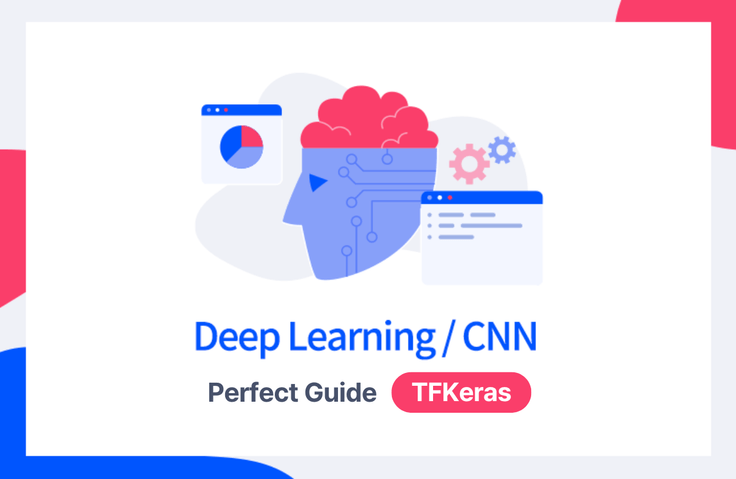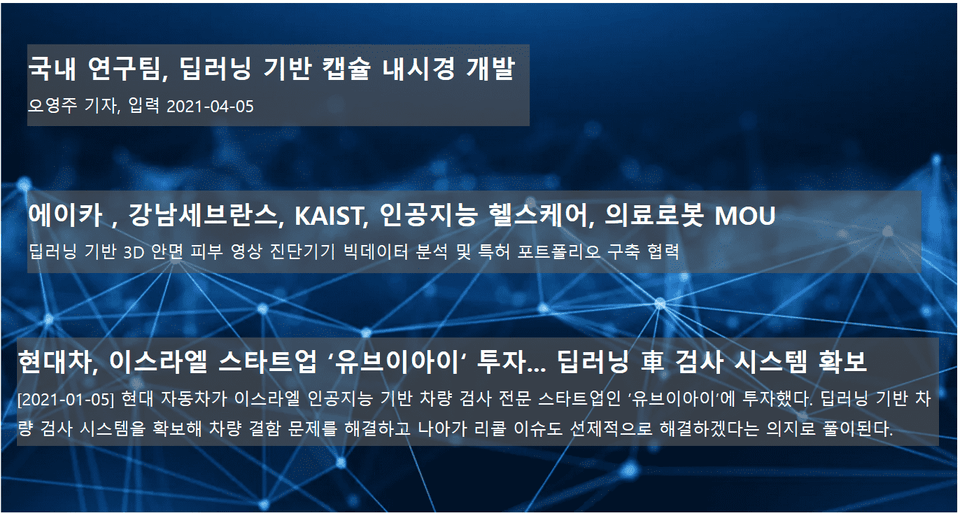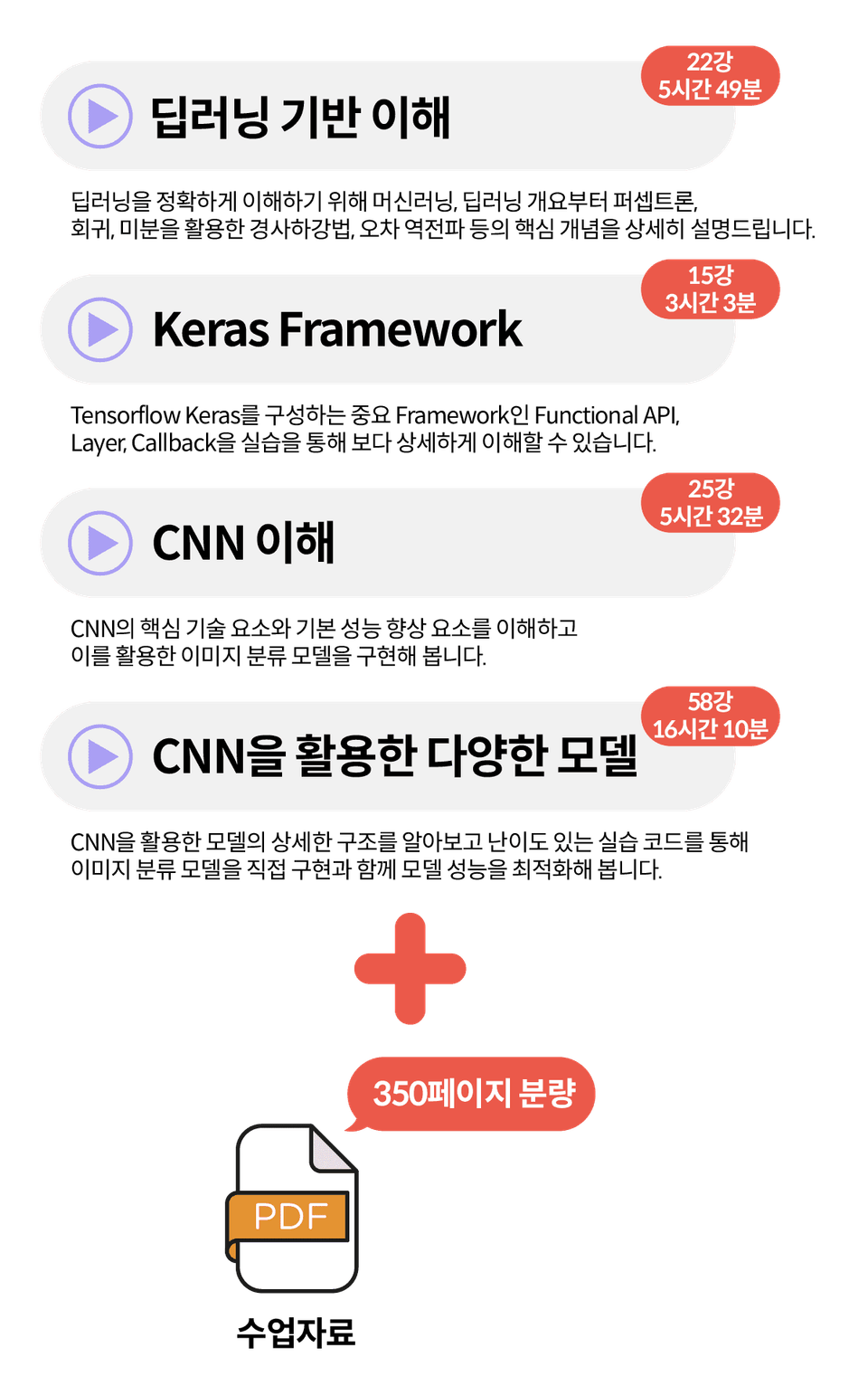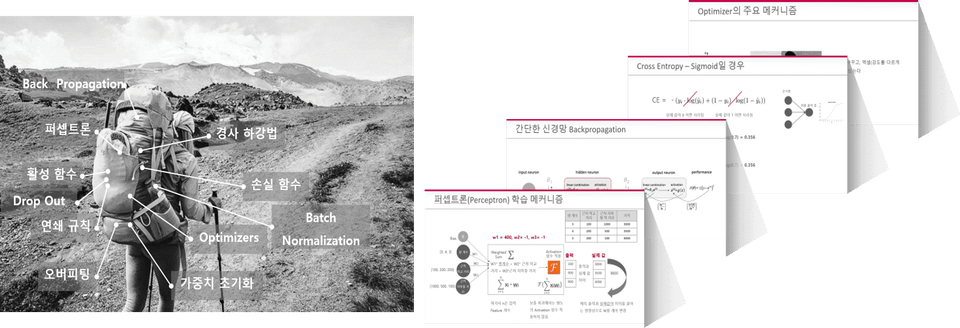![[改訂版] Python機械学習完全ガイド강의 썸네일](https://cdn.inflearn.com/public/courses/324238/cover/7e380aa0-48ba-4ee7-a6b2-8da7900568d6/324238-eng.png?w=420)
[改訂版] Python機械学習完全ガイド
dooleyz3525
理論中心の機械学習講座から脱却し、機械学習の核心的な概念を簡単に理解できるだけでなく、実践的な機械学習アプリケーションの実装能力を身につけることができます。
초급
Python, Machine Learning(ML), Statistics
ディープラーニング・CNNの核心理論から多様なCNNモデルの実装方法、実践問題を通じた実務ディープラーニング開発のノウハウまで、 ディープラーニングCNN技術の専門家として生まれ変わりたいなら、この講義をご一緒ください:)

ディープラーニング、CNNを構成する核心技術要素
Tensorflow, Keras를 구성하는 중요한 기반 Framework
CNN分類モデルの性能を向上させるチューニングのノウハウ
CNNを活用した画像分類の実装
多様な画像Augmentation技法とこれを活用したモデル性能向上技法
Keras ImageDataGeneratorとSequenceの詳細なメカニズム
ディープラーニングCNNのための画像データ前処理(Preprocessing)技法
AlexNet、VGGNet、Inception、ResNetなど主要なCNNモデル
XceptionやEfficientNetなどの最新モデルの適用
事前学習済みモデルのファインチューニング学習の理解と適用
様々なLearning Rate Scheduler技法を活用したモデル性能向上策
画像の前処理、データ加工、モデル生成、最適性能改善、性能評価など実務ディープラーニング開発方法

ディープラーニングの活用分野の中で、ディープラーニングCNNベースのコンピュータビジョン領域は、最も急激に成長しており、最も急速に変化している分野です。したがって、ディープラーニングベースのコンピュータビジョンの分野で専門家として成長するためには、CNNの実践的な実装能力と重要な能力を持つことが不可欠です。このために、「ディープラーニングCNN完璧ガイド - Fundamental編」の講義をリリースすることになりました。
今回発売した「ディープラーニングCNN完全ガイド - Fundamental」編はディープラーニングとCNNのコア技術要素についての深い理論と実習から、CNNイメージ分類モデル構築のための多様な実装技術とモデル性能最適化方法を提供します。そして、多くの実践例に従い、イメージの前処理、データロード、tf.kerasフレームワークの理解、最新のCNNモデルの内部アーキテクチャ、そして実践で活用できるモデルパフォーマンスチューニング法などを体得できるようにお手伝いし、皆様をディープラーニングCNN技術の専門家に成長させていきます。
130講義、30時間の講義を通じて、CNN理解に必要なすべての内容を深く込めました。
以下の学習内容と講義資料の一部を確認してください。

講義資料を事前に確認してください🙂


1.ディープラーニングとCNNを実現する重要な技術要素の深い理論と実践
ディープラーニングとCNNの核心基盤知識を深い理論と実習を通じて皆さんの頭の中にインストールさせます。

2. Tensorflow.Kerasを構成するコアフレームワークについて
Tensorflow.Kerasを構成するコアFrameworkの詳細な説明と実践を通じて、より柔軟でスケーラブルで強力なKerasベースのCNNアプリケーションを実装するのに役立ちます。

3. イメージ前処理からCNNモデル最適性能チューニングまで!
画像分類モデルの実装のAZを様々な実践例で習得し実戦能力を最大化



4. Modern CNNの発展に重要な基盤となったコアCNNモデルをソースコードレベルで詳細に説明します。
CNNを画像分類モデルを超えてさらに拡張されたアプリケーションに使用するには、Modern CNNモデルがどのように進化してきたのか、そしてそれらを構成する重要な技術が何であるかを理解することが重要です。このために、AlexNet、VGGNet、GoogLeNet(Inception)、ResNetなど重要なコアCNNモデルのアーキテクチャと特性、そしてこれらのモデルの実装をソースコードレベルで詳細に説明します。
練習環境は、Kaggleが提供するノートブックカーネルで行われます。 KaggleにサインアップしてからCodeメニューを選択すると、Colabに似たJupyter Notebook環境を利用できます。

Kaggle NotebookカーネルはGPU P-100 VMを無料で提供します。また、秀麗なUI環境とKaggleのさまざまなデータとも簡単に連動し、とても便利に実習を進めることができます。練習コードはTensorflow 2.4のtf.kerasに基づいて書かれています。より詳細な実習環境説明はセッション0の実習環境紹介動画を参照してください。
講義資料と実習コードは、「セクション0:講義紹介」と実習環境紹介の講義資料と実習コードのダウンロードから入手できます。
どの分野でも努力がなければ専門家になることはできません。いいえ、努力なしに専門家になった場合、それは専門家ではありません。あなたがディープラーニング分野の専門家になりたいという願望をよく知ることに、そしてそこに注ぐ努力の大切さをよく知るために、あなたがディープラーニング勉強に投資する少しの時間でも無駄な時間にならないように心血を傾けてディープラーニングCNN完璧ガイド講義を作りました。
この講義では、あなたがディープラーニングの専門家として成長することができる貴重なディンドルになります。
あらかじめ学ぶと役に立つ講義✨
クォンチョルミンのインタビューに会いましょう! |見に行く
学習対象は
誰でしょう?
ディープラーニングとCNNに関する基本的な能力を大幅に向上させたい方
CNNについて確実な理解が必要な方
コンピュータビジョン分野でディープラーニング画像分類モデルを活用しようとされている方
KaggleやDACONの画像分類コンペの準備をされている方
その他、ディープラーニング学習に関心のある方
前提知識、
必要でしょうか?
Pythonの基本的な実装能力と、Numpy、Pandasに対する基礎的な理解が必要です。
機械学習に対する基礎的な理解が必要です。(オーバーフィッティングや、なぜ学習/検証/テストデータセットが必要なのか、など)
27,115
受講生
1,391
受講レビュー
4,022
回答
4.9
講座評価
14
講座
(전) 엔코아 컨설팅
(전) 한국 오라클
AI 프리랜서 컨설턴트
파이썬 머신러닝 완벽 가이드 저자
全体
135件 ∙ (31時間 39分)
講座資料(こうぎしりょう):
4. 機械学習の理解
14:23
5. ディープラーニング概要
17:17
6. ディープラーニングの長短と特徴
17:53
8. 回帰概要とRSS、MSEの理解
13:37
9. 勾配降下法の理解
17:44
15. ミニバッチ勾配降下法の実装
17:18
16. 勾配降下法の主な問題
06:44
全体
118件
4.9
118件の受講レビュー
受講レビュー 2
∙
平均評価 5.0
5
全部見られなかったが、先に残す受講後期.. 【メリット】 1. 始める際に選手の知識についてよく整理してください。 2.川の名前はCNNですが、CNNに限らず、ディープラーニング基本機(SGD、Backpropなど..)を詳しく教えてくれるので、後にちょっと難しいアプリケーションが出ても理解可能 3. イメージの前処理も詳細なので、ビジョン側の基本技のない方も挑戦可能(クォンチョルミン講師様のビジョン側の講義を聞いてくることもおすすめ) 4. 単純な CNN 画像分類だけではなく、最近の CNN がどのように進化しているのか、また詳細な説明 5.講義資料にわかりやすく絵が多い 【惜しい点】 1. tf基盤講義だが、torchも…ㅎㅎ [総評] 5点。イメージ分野のディープラーニング入門の方は無条件に聞けばいいし、ただディープラーニングに入門される方もディープラーニング基本基が詳しく出ているので、入っておくと良いです。 CNN自体が正直最近ではイメージにしか使われず、NLPや予測モデリングにも使われているので、CNN深く理解して活用するのに最適です。
受講レビュー 1
∙
平均評価 5.0
5
こんにちは、現在人工知能を専攻で勉強している学生です。嘘をつかないで大学レベルカリキュラム通りに進めてくださりながら講義してください。します。そして難易度とは別に、学校の授業はPPTだけ読んで終わりましたが、このレッスンはコード一行に従うことができてとても良かったです。時々どの領域では本当に'え?これまで深く入っていくと!?'欲しいレベルで説明していただきありがとうございました。 (教授とわらのポイントと説明がほぼ同じように言われてびっくりしました) 残念なことは、現代の機械学習の頂点であるトランス、アテンションのような部分はまだ扱っていないということです。もしこの講義まで出てしまえば、クォンチョルミン先生はほとんどの国内機械学習私教育本座に登場することになりそうです。インフラで内金内産講義の中で最高の満足度です。
受講レビュー 7
∙
平均評価 5.0
受講レビュー 1
∙
平均評価 5.0
受講レビュー 2
∙
平均評価 5.0
5
CNN分野がディープラーニングを少しでもやってみたとすれば、比較的最初に接する分野だと思うが、思ったより原理を知らずに持って書いて柔軟な対処が難しいですね。 会社で必要になるたびにgithubを探して迷わず原理をよく知らず、その時、必要な機能を急いで組み合わせて作ったりします。 他の業務と並行しながらやってみると tensorflow2.4, keras, kaggle いつかは勉強しなければならず、ミルダが前回講義した講義を受講しながら進めた課題に object detection を使ってロボットの動きに成功的に適用して会社では専門家(?)として認められた記憶のために、CNNももう一度整理する兼、深く掘り下げる受講中にあります。 授業時間が少なくないのに、悪くないのがソースコードを詳しく説明してくださって全体的にスイープ~見て別に表記したが後でその時その時必要な部分だけもっと細かく聞いてみてもいいようです。 -------------------------------------------------- ------- 先日残した後期に追加して残します。 会社で別の業務を遂行し、再びコンピュータビジョン部門が作られ、再び復帰する次元で最初から頑張りました。 もう一度聞いてみると、以前に急いで進んだ部分がもう少し理解の幅が広がりますね。 やはり一度聞いて終わる講義ではありません。 もう一度推測します。
期間限定セール、あと5日日で終了
¥77,000
30%
¥13,638
知識共有者の他の講座を見てみましょう!
同じ分野の他の講座を見てみましょう!